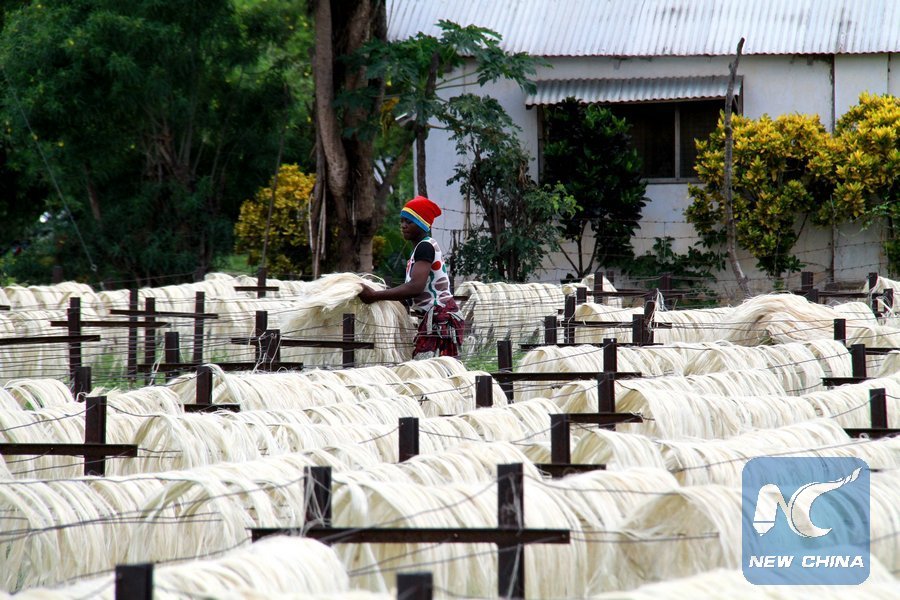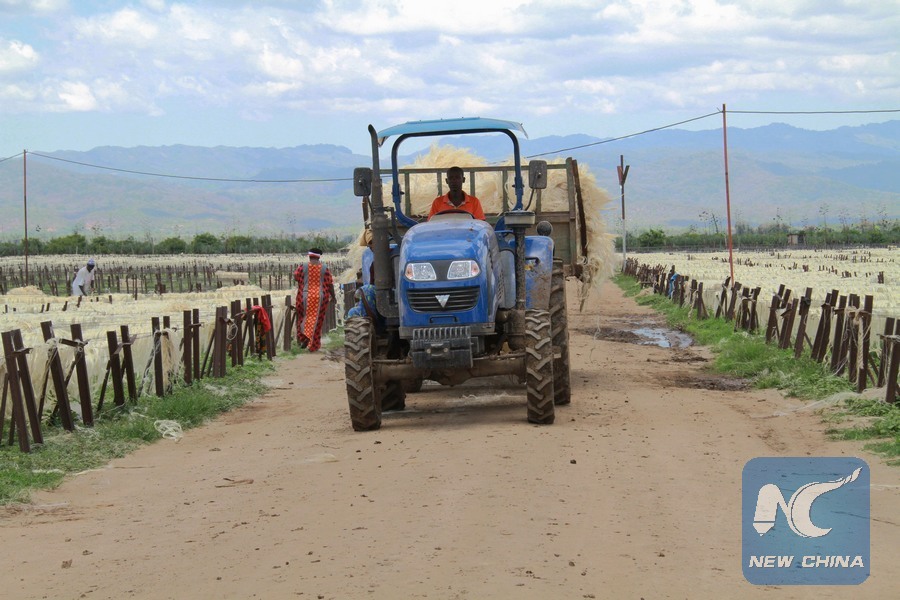
A local worker dries sisal fibre at a farm in Tanzania's Morogoro region on Nov. 15, 2017. The farm was established by China-Africa Agriculture Investment Co. Ltd in 2000. Currently, the farm has produced around 2,000 tonnes of sisal fibre annualy and has created some 10,000 jobs for Tanzania. (Xinhua/Li Sibo)
DAR ES SALAAM, April 17 (Xinhua) -- "I would like to welcome Chinese investors to come and invest in Tanzania and we will facilitate them in all ways," says Geoffrey Mwambe, the Executive Director of the Tanzania Investment Center (TIC).
TIC is the primary agency of the Tanzanian government to coordinate, encourage, promote and facilitate investment in Tanzania and to advise the government on all investment related matters.
Since the government of Tanzania is focused on industrialization, Mwambe encourages Chinese companies to come and invest in Tanzania. "Some of them have shown examples and we welcome other Chinese companies to do the same," he says in an exclusive interview with Xinhua.
Mwambe says trade between Tanzania and China continues to grow healthily, explaining that China remains Tanzania's largest trading partner, with bilateral trade amounting to 3.88 billion U.S. dollars in 2016.
China is also Tanzania's second-largest source of Foreign Direct Investment (FDI) and about 724 Chinese companies are registered with the TIC while more and more Tanzanians are entering into partnership in trade and investment with their Chinese counterparts, says the TIC CEO.
"We once again thank China for selecting Tanzania to be among the four pilot countries for China-Africa capacity cooperation," Mwambe told Xinhua in the east African nation's commercial capital Dar es Salaam this week.

Photo taken on Aug. 7 shows local people working in Chinese-invested Tooku Garments Company Limited in Benjamin Mkapa Export Processing Zone in Dar es Salaam, Tanzania. Some 2,700 Tanzanians are employed by the Chinese garments manufacturing firm which started operations in February 2012 by building a sewing and washing factory with sewage treatment, a generator and other infrastructure. (Xinhua/Li Sibo)
He said the partnership between the two countries can be remarkable through projects implemented through Chinese companies' support or support of the government of China.
He cites projects such as the 1,860-kilometer Tanzania-Zambia railway line commonly known as TAZARA, the Julius Nyerere Bridge which has created over hundreds of permanent jobs and the 60,000-seater national stadium, the most modern sports facility of its kind in East Africa.
Mwambe says there is no doubt that Tanzania-China relations have continued to grow over the years.
"Since independence, China has continued to share its expertise with Tanzania in various fields including the medical field, agriculture and construction," says the TIC CEO, adding: "Tanzania has continued to maintain a close relationship with China and both have continued to joining efforts to strengthen and expand the time-tested friendly relations between the two countries."
He says there are a number of ongoing efforts and activities which further enhance the friendly bilateral relations as well as bilateral trade and economic cooperation.
Mwambe says the Chinese investors are invited to invest in manufacturing, agriculture, livestock, fisheries, mining, tourism, economic infrastructure and information, communication and technology.
He says the manufacturing sector provides opportunities in the establishment of Export Processing Zones (EPZs) for the creation of international competitiveness for export-led growth. The EPZs are managed by the Export Processing Zones Authority (EPZA), a government agency.

A local worker transports sisal fibre at a farm in Tanzania's Morogoro region on Nov. 15, 2017. The farm was established by China-Africa Agriculture Investment Co. Ltd in 2000. Currently, the farm has produced around 2,000 tonnes of sisal fibre annualy and has created some 10,000 jobs for Tanzania. (Xinhua/Li Sibo)
He adds that the manufacturing sector covers the automotive industry focusing on the establishment of assembly plants and spare parts manufacturing facilities and oil, gas and chemical industries particularly construction of a liquefied natural gas plant.
"There are also opportunities in pharmaceutical industries targeting the construction, rehabilitation and providing support to strategic pharmaceutical industries," says Mwambe.
Other opportunities in the manufacturing industry are on agro-industries and agro-processing to add value to agricultural, livestock, forestry and fisheries products.
On the livestock sector, Mwambe says there are opportunities in establishing factories for processing meat, dairy and leather products such as shoes and bags.
He says the fisheries sector provides opportunities in the establishment of a fishing port and fishing in the Exclusive Economic Zone, the establishment of fish processing plants and modern fishing boat building yards, the establishment of dry docking and eco-tourism facilities and the establishment of commercial fish cage culture in both marine and freshwater areas, among other opportunities.

Photo taken on Nov. 15, 2017 shows a sisal field in a farm in Tanzania's Morogoro region. The farm was established by China-Africa Agriculture Investment Co. Ltd in 2000. Currently, the farm has produced around 2,000 tonnes of sisal fibre annualy and has created some 10,000 jobs for Tanzania. (Xinhua/Li Sibo)
Opportunities in the tourism industry include construction of tourist hotels, establishment of leisure parks, investing in conference tourism facilities and provision of air/ground transport, says Mwambe.
"Potential investors looking to invest in Africa should look first at Tanzania because it has a lot of potential for development, combined with a track record of more than 50 years of political stability," says the TIC CEO.
He adds: "Tanzania is also the only country in Africa that integrates the East African Community and the Southern African Development Community," adding that Tanzania also faces the Indian Ocean, which is the gateway to markets for Asia markets and landlocked African countries.

